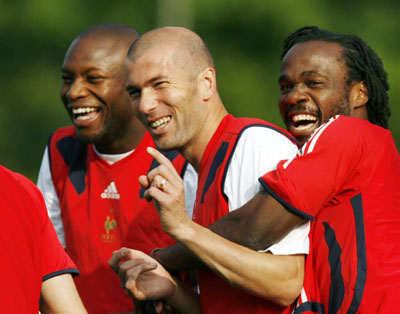France's jubilation over unexpectedly making it to the World Cup final has
barely reached the hardened kids kicking stones in front of this
graffiti-streaked, urine-stained housing project.

France's Zinedine
Zidane (C) jokes with team mates William Gallas (L) and Louis Saha during
their World Cup soccer training session in Berlin, July 8,
2006.[Reuters] |
The crowd mirrors the multicultural team, many players hail from tough,
immigrant neighborhoods like this. But their fairy tale triumph has done little
to overcome the alienation and despair that pushed youths in La Courneuve and
other suburbs around France to rampage for weeks last fall, in riots that shook
the nation.
"When they win, we hug each other and jump and shout and shout," said one of
the teenagers, Jalil. The next day, though, it's "like always." He didn't want
to give his last name because he fears the police.
His words clash with the energized optimism that has gripped French leaders
and media as France advanced to Sunday's final against Italy.
Each win along the way bucked expectations, and provided a welcome surprise
for a nation struggling with discrimination, political scandal and stalled
reforms,and one that had little faith in the aging, struggling national team
going into the Cup.
Prime Minister Dominique Villepin,keen to tap the enthusiasm to boost his
dismal reputation,sought to persuade a group of high school graduates from
disadvantaged schools that the World Cup wins would trickle down to them, too.
"You have the talent, the abilities, the heart. Nothing should stop you. I
want you to be able to dream big," he told them, in a meeting this week focusing
on France's soccer success.
The French tricolor undulates on Paris' Champs-Elysees and other avenues as
the capital gussies up for Bastille Day celebrations July 14. Many hope the
flags will provide a fitting backdrop for mass partying Sunday night if France
wins.
But a few kilometers (miles) northeast of town in La Courneuve, no flags are
in sight.